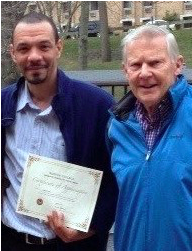Mentoring for young people leaving foster care: Promise and potential pitfalls
Spencer, R., Collins, M. E., Ward, R., & Smashnaya, S. (2010). Mentoring for young people leaving foster care: Promise and potential pitfalls. Social work, 55(3), 225-234.
Summarized by Jeremy Astesano
Notes of Interest:
- Children in foster care, who lose access to that support system around the time they legally become adults, are a group who can benefit substantially from being in mentoring programs.
- Psychosocial and vocational outcomes for these youth are generally quite poor
- Mentoring can be a useful tool for people leaving care as they lose support from the foster care system, however, certain aspects of mentoring may make these types of relationship come up short of being a catch-all solution (p. 229).
- In addition to adhering strictly to mentoring best practices, the authors call attention to the ongoing work that needs to be done at the societal and system level to the outcomes and thus the lives of youth transitioning from foster care.
Introduction (Reprinted from the Abstract)
Mentoring for youths transitioning out of the foster care system has been growing in popularity as mentoring programs have enjoyed unprecedented growth in recent years. However, the existing empirical literature on the conditions associated with more effective youth mentoring relationships and the potential for harm in their absence should give us pause, as meeting these conditions may be especially challenging when working with transitioning youths. Using the social work professional lens to examine the potential and challenges of mentoring approaches for foster care youths, the authors review the literature on the effectiveness of youth mentoring programs and on the psychosocial outcomes and needs of youths leaving foster care. They offer a set of considerations for maximizing the potential benefits of mentoring for transitioning youths. The authors suggest that although mentoring may serve as an important component of a larger complement of services for transitioning youths, an individual-level intervention such as this does not eliminate the need for more systemic action to meet the many needs of these vulnerable youths.
Implications
Mentoring, if done well, may hold the potential to meet some of the critical needs of youths transitioning from foster care to independent living and early adulthood. However, given the heightened vulnerabilities and complex needs of these youths, social workers should proceed with caution. Protecting foster youths from further rejection or disappointment must take precedence; this priority dictates, at minimum, diligent adherence to the best practices gleaned from the research on youth mentoring more generally. There is no doubt that, as a report from the Casey Family Programs (2001) asserted, “every young person who leaves the child welfare system” needs to be “connected with a competent, caring adult” (p. 3). The question, rather, is whether and under what conditions is a volunteer mentor likely to reliably and effectively serve in this role.
Several steps in filling the gaps in empirical knowledge are warranted. Obviously, a serious commitment of evaluation of these interventions is needed, with the use of progressively rigorous designs for constructing the knowledge base. Evaluations should be a requirement of receiving funding for mentoring interventions. Evaluations should provide explicit attention to the characteristics of the youths, the mentors, and the program so that comparisons across programs can be made. Each intervention should articulate a clear program philosophy and theory of change so that evaluations can be based on program theory and not the simple collection of outcome data. The practice field must encourage the replication of existing models rather than the design of new models that may fit agency resources but do not necessarily build the knowledge base. Finally, ongoing efforts to synthesize the research base are needed.
Still, the mentoring approach, particularly one-to-one mentoring, remains an individual-level solution to what are inherently systemic problems. Families involved with the child welfare system struggle with poverty, mental illness, domestic violence, homelessness, and other social problems primarily rooted in systemic challenges related to social class, racism, and sexism. A sound mentoring program may prove to be a key ingredient to helping some youths to achieve a successful, healthy, productive adulthood, relatively free of these types of social problems. Yet disproportionate attention to mentoring as a solution might continue to prohibit the enactment of more comprehensive solutions to the problems plaguing vulnerable families. As is often the case in social work, both micro and macro efforts will need to occur simultaneously. The profession must not lose sight of the need to tackle the far more difficult structural challenges while working to assist individual youths in the immediate term.
To access this article, click here.










